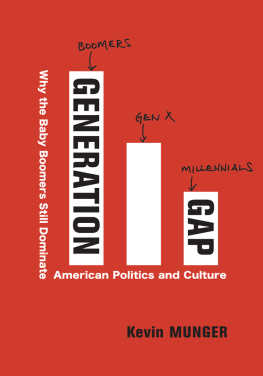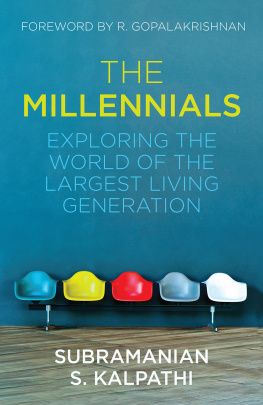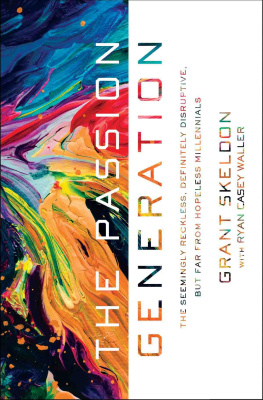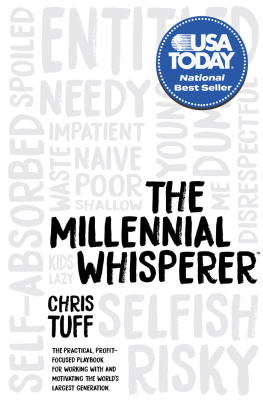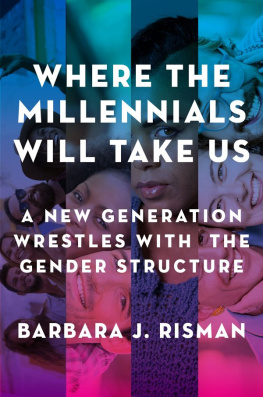WHAT PEOPLE ARE SAYING ABOUT
Millennials and the Moments That Made Us
Shaun Scott is a budding master of prose. His sentences are tied up in humor, contemporary cultural criticism, head-shaking sadness, and hope. His new work might be the beacon Millennials turn to in staggering times, as his pages are filled with inspiringly precise language.
Jake Uitti, Contributing Writer, Washington Post
Millennials are presented as a cultural black box at best and a poorly-executed caricature at worse. With references ranging from Milton Friedman to Hotline Bling, Shaun Scott creates the most accurate portrayal of the Millennial condition currently in printwhat weve endured, what weve created, and, perhaps most essentially, what actionable policies we need to enact in order to thrive.
Hanna Brooks Olsen, Writer and Cultural Critic
The situation of Millennials in neoliberal capitalism is still under-theorized, and Scotts analysis is informed theoretical work.
Sarah Grey, Writer, Founder of Grey Editing
Shaun Scotts Millennials and the Moments That Made Us is a depiction of what life is like for Millennials in the age of corporatism, racism, and rampant consumerism. Where Orwells fictional 1984 leaves off, Scott begins; because you cant change the future without having a firm understanding of the past.
Sylvia Hysen, Managing Editor, Millennial Magazine
First published by Zero Books, 2018
Zero Books is an imprint of John Hunt Publishing Ltd., Laurel House, Station Approach, Alresford, Hants, SO24 9JH, UK
office1@jhpbooks.net
www.johnhuntpublishing.com
www.zero-books.net
For distributor details and how to order please visit the Ordering section on our website.
Text copyright: Shaun Scott 2016
ISBN: 978 1 78535 583 7
978 1 78535 584 4 (ebook)
Library of Congress Control Number: 2017930561
All rights reserved. Except for brief quotations in critical articles or reviews, no part of this book may be reproduced in any manner without prior written permission from the publishers.
The rights of Shaun Scott as author have been asserted in accordance with the Copyright, Designs and Patents Act 1988.
A CIP catalogue record for this book is available from the British Library.
Design: Stuart Davies
Printed and bound by CPI Group (UK) Ltd, Croydon, CR0 4YY, UK
We operate a distinctive and ethical publishing philosophy in all areas of our business, from our global network of authors to production and worldwide distribution.
Foreword
By Marissa Jenae Johnson
The world we inhabit seems hard to understand for many. The increasing racial tensions in America, the election of Donald Trump, and the global backlash to generations of parasitic capitalism has many of us working hard to reconcile the people we always imagined ourselves to be with the reality that becomes apparent in the light of day. Life, when engaged, seems to be a continual act of unlearningof peeling back the layers of the stories you were told about who you were to reveal all the beautiful possibilities and harrowing inadequacies.
Nothing is as we thought it was. Or as it should be. We are not as kind as we thought we were. We are not as smart as we thought we were. We are not as far along on race; we are not as open-minded with regards to gender. Far from the enlightenment ideals we were taught about ourselves, the question demands asking: Are we better people than generations before, or worse?
The answer, it seems, is somewhere in between and somewhere altogether different. In looking at the good we imagine ourselves to be and the evil we have shown ourselves capable of, there is no absolute true self. Instead we find our realities caught between the two; reaching for that which we aspire, while falling into old patterns we thought we had left behind with our fathers and mothers.
This book, like a reflection in a mirror, captures us in that war of self and imagination. It tells the truth of the time we find ourselves in and the people we have become not by answering the question, but by adding dimension to the background. Layer after layer, Scott complicates the narratives we tell about Millennials and the world we live in, and in each chapter, he reveals a part of ourselves we never knew through the poignant analysis of the moments we all remember.
As a Black woman and Millennial, its rare these days that I read something and feel like it helps me understand who I am. This book does. Born in 1991, Im caught right in the crosshairs of the Millennial generation. Though I consider myself someone who stands out from the crowd, my life runs parallel to the narrative Scott weaves through his unpacking of pop culture. Like many other Millennial adults, the realities of my life contradict the ideals and aspirations I was taught as a child.
Not only was I steeped in the propaganda of meritocracy against the background of worldly circumstances that proved otherwise, but my interracial family was seen as a sign of progress despite a childhood hedged by the boiling tensions of a racial past never reckoned with. I worked hard throughout school to be the best at everything, assured that that was all it took to escape poverty.
But when the time for college came, I found myself the sole income earner for my family, trapped in the fallout of the Great Recession. Everywhere I turned, all assurances went out the window.
Somehow I did make it to college, and struggled to pay for it throughout. By the time I graduated I was working six jobs and going to school full-time. Graduation day came and went and the stable, middle-class job I was always promised was nowhere to be found. Days after receiving an education that cost over six-figures, I was hopeful to get a job that paid $15 an hour. All the promises of prosperity that were made to me felt like a lie as I struggled, fully aware that my personal failure was a failure for my family. I was supposed to move socioeconomic classes and bring them along. Far from the trope of entitled Millennial, my family depended on me to survive.
I had done all the right things, and yet I had failed.
Though I didnt find the conventional path promised to me, the changing political climate found me. Shortly after the Ferguson Uprising I became a part of the #BlackLivesMatter movement, rising to national prominence in August 2015 when I helped steal the stage from presidential candidate Bernie Sanders in my and Scotts city of Seattle.
For all the visibility and media and press, this movement had not made my path in life anymore sure or my socioeconomic failure any less real. I was like any other Black Millennial: struggling to find peace in a world at war with Black bodies and under the weight of a capitalist system where we could never get ahead. Far from the progressive future I was promised I could have if I worked hard, the future now looked grim.
What kind of future could there be if you could not pay your student loans, but it didnt matter because the police might kill you before then? What kind of future is there for a Black Millennial who is told to fight for prosperity but thrust into the conditions of war?
There are no simple answers for how we forge forward. But in this book, Scott paves the way by giving the question color. Scott examines how Millennials both respond to the context we have been thrown into, and also how we create new worlds of our own. Our solutions for survivaland for the thriving of the next generationwill come out of that duality. We are and will be molded by the unimaginable moments of these times, but we will also find escape and healing in the world we create that does not yet exist.


